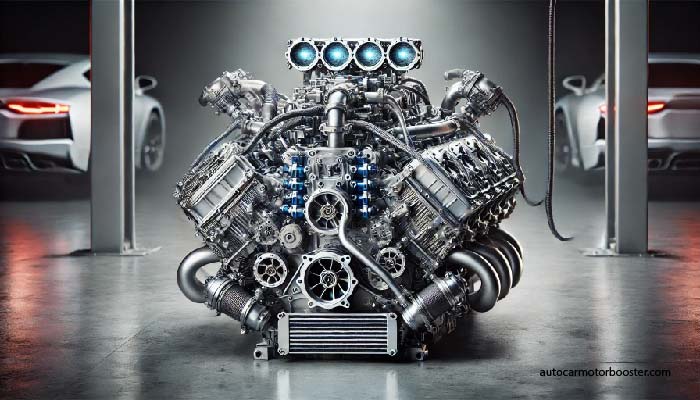In the world of high-performance vehicles, managing engine heat is a critical factor that determines both performance and longevity. High-performance engines, especially those equipped with turbochargers or superchargers, generate significant amounts of heat due to the increased power output. If left unchecked, excessive heat can lead to engine damage, reduced efficiency, and even catastrophic failures.
This article delves into the causes, challenges, and solutions for managing engine heat in boosted engines, ensuring your vehicle delivers peak performance safely.
Understanding Engine Heat in Boosted Systems
High-performance engines operate under extreme conditions. The boosting systems—turbochargers and superchargers—compress air entering the engine, which results in higher combustion temperatures. While this process enhances power, it also significantly increases thermal stress on the engine components.
Key Factors Contributing to Excessive Heat:
- Increased Air Compression: Boosting systems compress air, increasing its temperature.
- High RPMs: Sustained high RPMs generate additional friction and heat.
- Fuel Combustion: Higher fuel injection rates lead to hotter combustion cycles.
- Restricted Airflow: Insufficient airflow to radiators or intercoolers reduces cooling efficiency.
Why Managing Heat is Critical
Unchecked heat can compromise engine performance in the following ways:
- Component Wear: Excessive heat accelerates the wear and tear of components like pistons, valves, and gaskets.
- Power Loss: Overheating causes engines to enter limp mode, reducing performance to prevent damage.
- Engine Failure: Prolonged heat exposure can cause cracks, warping, or even a complete engine seizure.
Strategies to Manage Engine Heat
Managing engine heat involves a combination of mechanical upgrades and driving habits. Below are effective methods to ensure optimal temperature control:
1. Upgraded Cooling Systems
- High-Performance Radiators: Upgrading to aluminum or multi-core radiators improves heat dissipation.
- Electric Fans: High-flow fans provide better airflow, especially in stop-and-go traffic.
- Water Pump Enhancements: Performance water pumps circulate coolant more efficiently.
2. Intercoolers
Intercoolers cool the compressed air from turbochargers or superchargers before it enters the engine. Opt for:
- Front-Mount Intercoolers: For maximum cooling efficiency.
- Air-to-Water Intercoolers: Suitable for compact engine bays or extreme cooling needs.
3. Thermal Management Coatings
Applying thermal barriers to engine components helps:
- Reduce Heat Transfer: Coatings on pistons and headers prevent heat buildup.
- Improve Efficiency: Reflective materials maintain optimal temperatures in the combustion chamber.
4. Engine Oil and Coolant Choices
- Use high-temperature synthetic oils to withstand the heat generated by boosting systems.
- Ensure your coolant mixture is suited for high-performance applications. Consider coolants with anti-corrosion additives for added protection.
5. Monitor Engine Parameters
Install gauges to monitor critical parameters like:
- Oil Temperature
- Coolant Temperature
- Exhaust Gas Temperature (EGT)
6. Avoid Heat-Soak
Heat-soak occurs when engine components retain heat even after the engine is turned off. To combat this:
- Allow the engine to cool down by idling for a minute before shutting off.
- Install turbo timers to cool turbochargers automatically.
Common Myths About Engine Heat Management
- “More coolant always solves overheating.”
- Fact: Coolant efficiency depends on circulation and radiator capacity, not just volume.
- “Bigger intercoolers always improve performance.”
- Fact: Oversized intercoolers can cause turbo lag due to increased airflow distance.
- “High-performance engines don’t need additional cooling systems.”
- Fact: Without upgrades, boosted engines are prone to overheating under heavy use.
FAQs About Managing Engine Heat
1. What are the signs of engine overheating?
- Symptoms include high coolant temperatures, loss of power, steam from the engine bay, and unusual smells (e.g., burning coolant).
2. Can synthetic oil help in managing engine heat?
- Yes, synthetic oils are engineered to withstand higher temperatures and reduce friction more effectively than conventional oils.
3. How often should intercoolers be cleaned?
- Intercoolers should be cleaned every 12,000–15,000 miles to maintain optimal airflow and cooling efficiency.
4. Is it necessary to upgrade the radiator for a boosted engine?
- Upgrading the radiator is highly recommended, as stock radiators often lack the capacity to handle the additional heat generated by boosting systems.
5. What is heat soak, and how can it be prevented?
- Heat soak occurs when engine components retain heat, reducing performance. Prevention methods include using turbo timers, heat shields, and improving engine bay ventilation.
Conclusion
Managing engine heat in high-performance boosting systems is essential for maintaining power, efficiency, and durability. By investing in effective cooling systems, using the right engine oils and coolants, and adopting smart driving habits, you can ensure your engine performs at its best under any condition.
If Like This Article Visit Our Website. Collect From Wekiapedia
